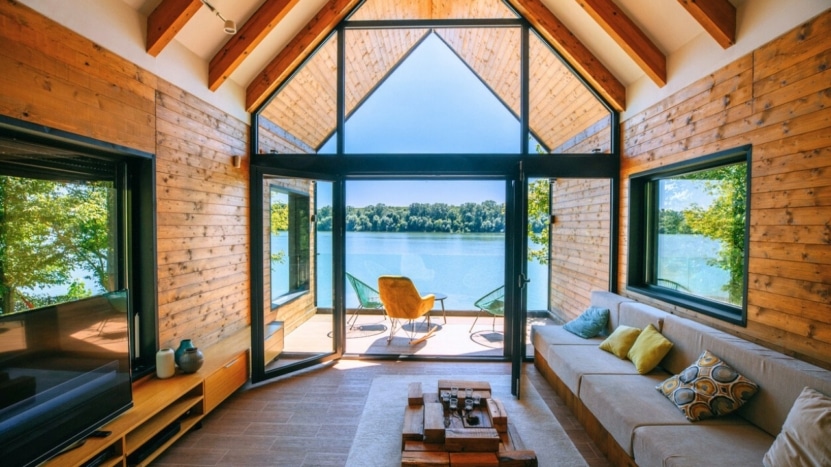Have you ever imagined owning a cozy retreat away from the hustle and bustle of daily life? If the thought of buying a vacation home excites you, you’re not alone! Vacation home buyers often find themselves wondering about the logistics, especially when it comes to financing.
Purchasing a vacation home is an exciting opportunity, whether you see it as a personal getaway or an investment property. In this guide, we’ll explore what it takes to make your vacation home dreams come true.
What To Consider Before Buying A Vacation Home
If you’re considering buying a vacation home, it’s essential to consider several factors before you begin your search. Unlike a traditional property, a second home comes with its own set of challenges and advantages. Keep these considerations in mind as you begin searching for your perfect property.
Vacation homes are a large investment – Many popular vacation spots demand top dollar for available properties. You should set a realistic price range for your desired location, research how much money you will need to put down, and budget for any maintenance or updates the home may need.
The real estate market varies – The real estate market fluctuates constantly, making home prices rise and drop. Monitoring the market in your preferred area will help you better understand the best time to buy. If you plan on renting out your home, check to ensure the area isn’t too oversaturated with rental properties. Oversaturation, however, can also foster buying opportunities, as many would be investors are now selling because their properties are not generating enough cash flow to make their vacation properties affordable.
You may receive tax benefits – You may receive tax benefits on your vacation home loan and property taxes if you use the property as a secondary residence or even as an investment property. These deductions can include:
● Rental property mortgage interest deduction
● Personal residence mortgage interest deduction
● Property tax deduction
* Investment property tax losses, for buyers who deem their properties investments.
Note: This is not tax advice. Please consult with your CPA to evaluate all considerations.
Exploring Your Vacation Home Loan Options
When it comes to financing your vacation retreat, you have several mortgage options at your disposal. From traditional fixed-rate or adjustable-rate mortgages to leveraging your home equity with a line of credit, the choices are vast. Remember, while FHA and VA loans are off the table for vacation homes, there are still plenty of other attractive options to explore.
Choosing the right type of loan financing is a significant part of purchasing a vacation home. Here are the various mortgage options you might consider:
Conforming Loans:
- These are mortgages that “conform” to the guidelines of Fannie Mae and Freddie Mac, the agencies that back over 90% of all mortgages funded in the U.S. These loans are also subject to the “maximum conforming loan limits” for a particular area, which you can check here. If your desired mortgage amount exceeds the loan limit, you will be subject to more stringent jumbo mortgage guidelines, discussed below.
- These loans require a minimum of 10% down and come with interest rates that are anywhere from 1/4% to 2.0% higher than the rates associated with primary residence financing, depending on credit score and down payment percentage.
Jumbo Loans:
- As mentioned above, these are mortgage loans that exceed the conforming loan limit for a particular area. Jumbo loans typically have higher interest rates and more stringent underwriting guidelines.
While some jumbo mortgage programs only require 10% down for a 2nd home purchase, the more competitive programs with lower rates require a minimum of 20% down or more in many cases. Similar to conforming loans, jumbo 2nd home financing typically also comes with much higher interest rates.
Government Backed Loans:
- As mentioned above, government backed loans (FHA, VA and USDA) are not available for 2nd homes.
Fixed-Rate Mortgages vs. Adjustable-Rate Mortgages (ARMs):
- Fixed-rate mortgages are more often recommended and preferred for several reasons: (1) they have fixed rates and monthly payments, as the name implies – making budgeting much easier and more predictable; (2) while ARMs may offer lower rates in the near term and the benefit of even lower rates, if rates fall, they also come with the risk of higher rates and higher payments, should rates increase; and (3) ARMs have not been competitive for several years, as of the date of this blog, because the “yield curve” has been inverted, meaning that short-term rates are often higher than long-term rates.
- ARMs are sometimes more advantageous though for jumbo borrowers with short term borrower horizons of 7 years or less.
Sources for Down Payment Funds:
- Savings and investment accounts.
- A home equity line of credit (HELOC) against your primary residence.
- A cash-out mortgage against your primary residence. A cash-out mortgage, as a quick reminder, involves the refinancing of your current mortgage into a new and larger mortgage, with the difference being the “cash-out,” once closing costs and prepaid items are netted out.
- Gifts from relatives or friends for down payments are typically NOT allowed for vacation home financing.
Vacation Home Loan Requirements: What to Prepare For
Eager to get approval for a vacation home loan? Understanding the requirements is key. From cash reserves and debt-to-income ratios to down payments and credit scores, each element plays a crucial role. While requirements may vary among lenders, being well-prepared can significantly smooth out the process.
Understanding these requirements will help you prepare better for the application process. Here are the key factors:
Cash Reserves:
- Most lenders require proof of sufficient cash reserves.
- Lenders typically require anywhere two to twelve months’ worth of mortgage payments in reserves, after close, depending on the loan program (jumbo lenders tend to be more restrictive).
Debt-to-Income Ratio (DTI):
- Your DTI should ideally be no higher than 45% in most cases.
- This ratio is crucial in determining your ability to manage monthly payments.
Down Payment:
- Expect to pay a minimum of 10% down for most vacation home loans as mentioned above, while some jumbo lenders will require as much 25% down.
- The exact percentage can vary based on lender requirements and your credit history.
Credit Score:
- A higher credit score is usually needed for vacation home loans, often at least 660.
- This differs from the typical 620 score requirement for many primary residence mortgages.
What Documents Do I Need For A Vacation Home Loan Application?
When applying for your vacation home loan, having the right documents at hand is vital. From proof of income to mortgage statements and a detailed list of your monthly debts, being organized can make a world of difference.
Key Documents You May Need:
- Recent pay stubs
- W-2 forms or tax returns (last two years)
- Statements for any existing mortgages
- Bank statements
- Investment account statements
- Credit report (lenders will obtain this)
- List of current debts (e.g., car loans, credit cards)
- Government-issued ID (e.g., driver’s license, passport, visa)
- Property Information (if already selected)
View mortgage rates for April 29, 2024
Tips & Tricks For Choosing the Perfect Vacation Home
Selecting the right vacation home is a big decision. Whether you’re looking for a charming seaside cottage or a serene mountain cabin, it’s important to get the best value for your investment. Collaborating with a knowledgeable real estate agent can be invaluable in this process, helping you find hidden gems and guiding you through the local market.
If you need help finding a knowledgeable real estate agent in the area you’re hoping to buy a vacation home, we are happy to refer you to one of our vetted agent partners.
Renting Out Your Vacation Home
Not using your vacation home year-round? Consider turning it into a vacation rental property! This can be a fantastic way to cover your mortgage expenses while generating rental income. With the right property manager and strategic use of listing sites, your investment property could start yielding returns sooner than you think!
Co-Ownership: A Unique Approach to Vacation Home Buying
Have you considered buying a vacation home through co-ownership? This innovative approach allows you to own a fraction of a property, sharing the costs and responsibilities with others. Companies specializing in co-ownership handle maintenance and upkeep, offering a hassle-free way to enjoy your vacation home. At JVM Lending, we can discuss and explore creative co-ownership options with you.
Frequently Asked Questions
Can I afford a vacation home?
Assessing affordability involves considering not only the purchase price but also ongoing expenses like property taxes, insurance, maintenance, and any property manager fees. Our team at JVM Lending can help you evaluate your financial situation to determine if a vacation home is within your reach. Reach out to us to set up a time to review your vacation home goals.
What are the benefits of owning a vacation home?
Owning a vacation home offers several benefits, including a personal retreat, potential rental income, long-term appreciation, and possible tax deductions. Plus, it can be a valuable asset to pass down to future generations.
How do mortgage rates for vacation homes compare to primary residences?
Mortgage rates for vacation homes are typically higher than those for primary residences due to the increased risk lenders associate with secondary properties. However, they can still be very competitive, especially with a strong credit profile and a large down payment
What’s the difference between a vacation home and an investment property?
A vacation home is primarily used for personal enjoyment, while an investment property is purchased mainly for generating rental income. Mortgage interest rates, down payment requirements, and tax implications can vary significantly between the two. Many vacation home buyers often bridge the two as well, renting out their homes as much as possible when they are not enjoying them themselves.
Can I still obtain vacation home financing if I intend to rent out my vacation home?
The answer is yes, as this is a very common scenario for most vacation home buyers. If you are buying the property with the sole intention of using it as a rental without furnishing it and/or ever visiting it yourself, the property could be deemed an “investment property” instead of a vacation home, and that could impact your financing options and costs.
How much down payment do I need for a vacation home?
Lenders that offer conforming financing backed by Fannie Mae and Freddie Mac require a minimum of 10% down payment for vacation home purchases, though this can vary based on your credit score, loan type, and other factors. Jumbo lenders, however, typically require 20% or more for a down payment – with a few exceptions by some lenders but these loans have higher rates and fees. JVM Lending can help you understand what down payment you’ll need based on your specific situation.
Can I use rental income to qualify for a vacation home loan?
Some lenders allow you to use projected rental income to qualify for your mortgage loan, but this often requires demonstrating rental income potential and may involve additional requirements or higher interest rates. This will also likely result in the property getting deemed an “investment property” instead of a vacation home, and that could change your financing options.
What are the tax implications of owning a vacation home?
If you use the property as a second home, you may be eligible for mortgage interest and property tax deductions. If you rent it out, there could be additional tax benefits. It is possible to have a property that is both a second home and a rental property, but you should contact a CPA for tax advice.
What should I consider when choosing the location of my vacation home?
Consider factors like accessibility, the potential for rental income, climate, local attractions, and long-term property value trends. With respect to rental income, you should consider both market rates and the number of competing rentals in your desired market. Some markets have become glutted as result of the increased interest short-term-rentals. Also, think about how often you’ll realistically visit the home based on its location.
How does buying a vacation home impact my credit?
Like any major purchase, buying a vacation home can impact your credit. It’s important to maintain a good credit score before and after the purchase to ensure the best mortgage rates and terms.
Can I buy a vacation home if I already have a mortgage?
Absolutely! Owning a primary residence doesn’t disqualify you from buying a vacation home. Lenders, including JVM Lending, often provide attractive rates for vacation home loans, considering factors like your credit score, payment history, and income. It’s all about making informed choices and understanding the nuances of the loan process for your second home purchase.
Let’s Make Your Vacation Home Dream a Reality with JVM Lending!
Thinking about buying a vacation home can be overwhelming, but it doesn’t have to be. At JVM Lending, we’re committed to guiding you through every step of the mortgage process. From initial considerations to finalizing your loan, our expertise and personalized service ensure that your journey to owning a vacation home is as smooth and enjoyable as possible.
Ready to start this exciting adventure? Fill out your vacation loan application HERE or reach out to the mortgage experts at JVM Lending at (855) 855-4491 or [email protected].







